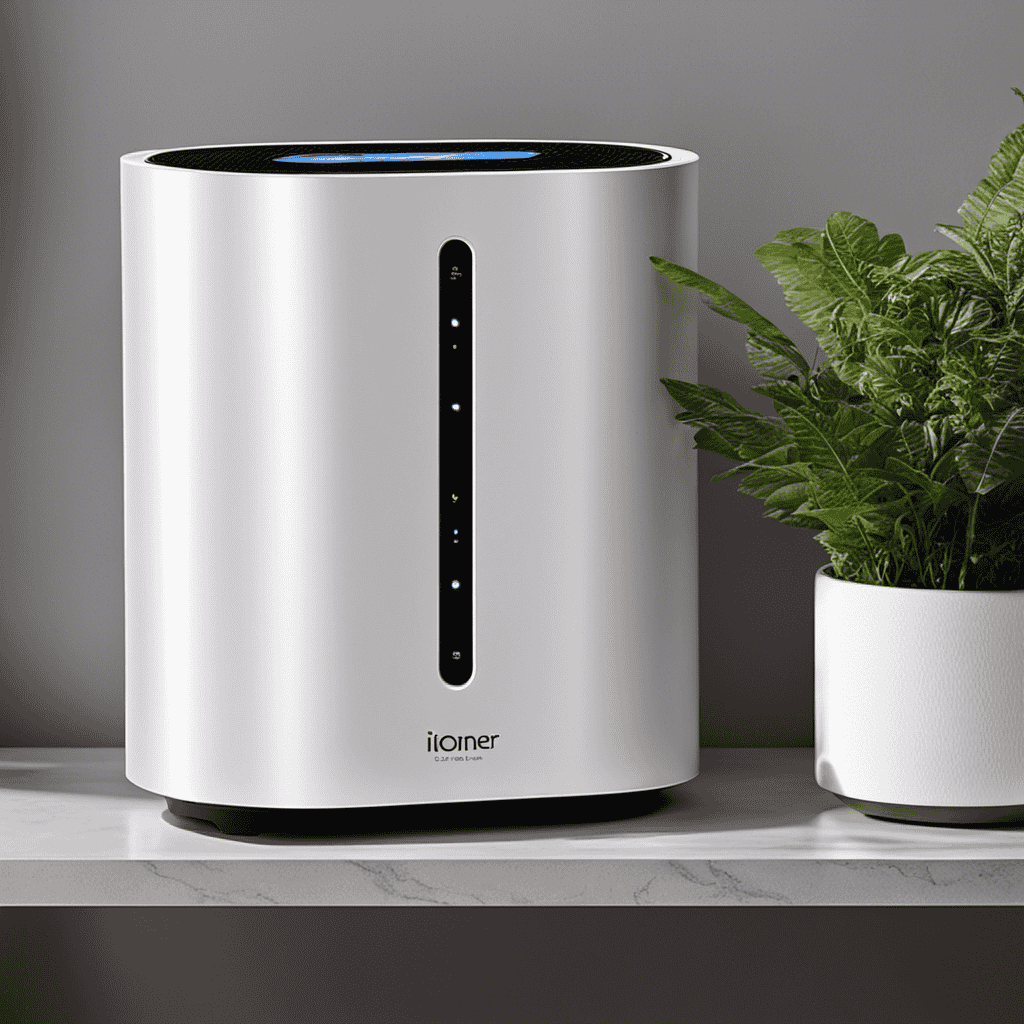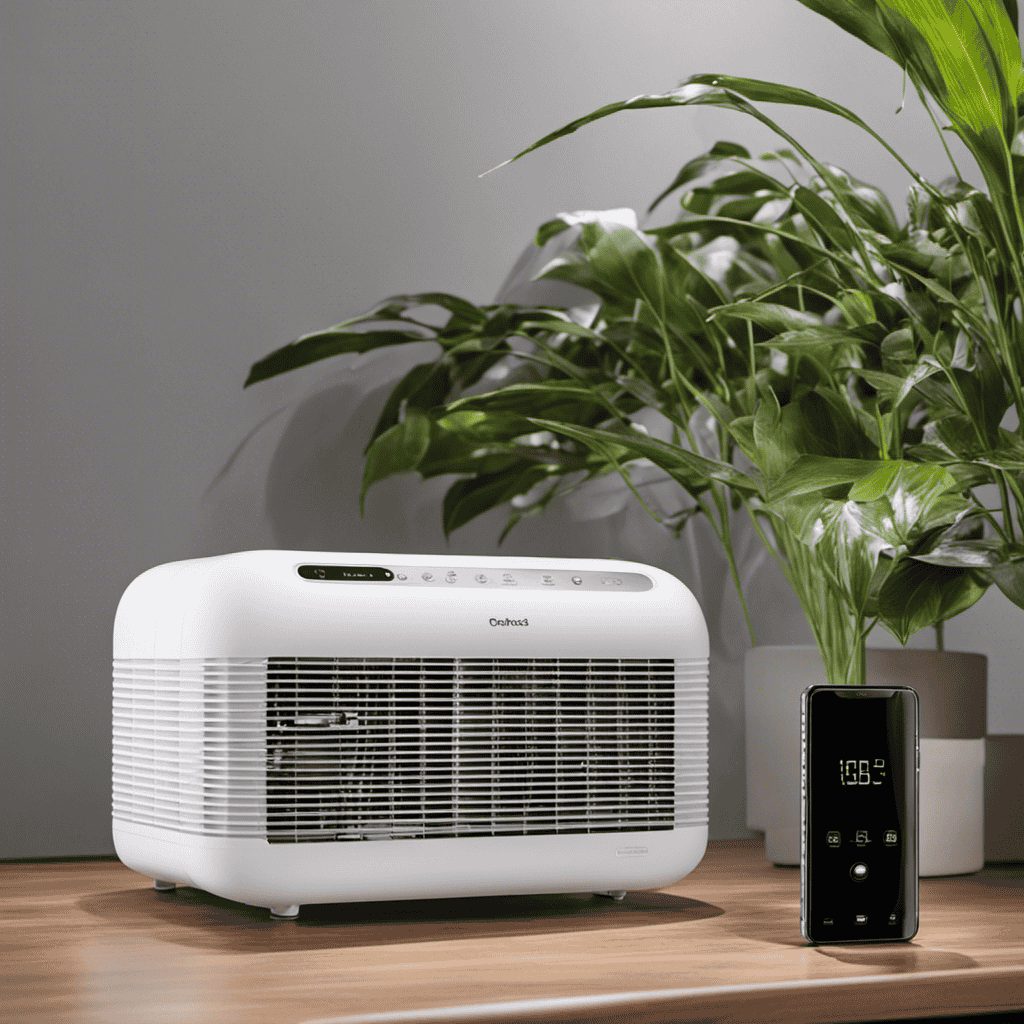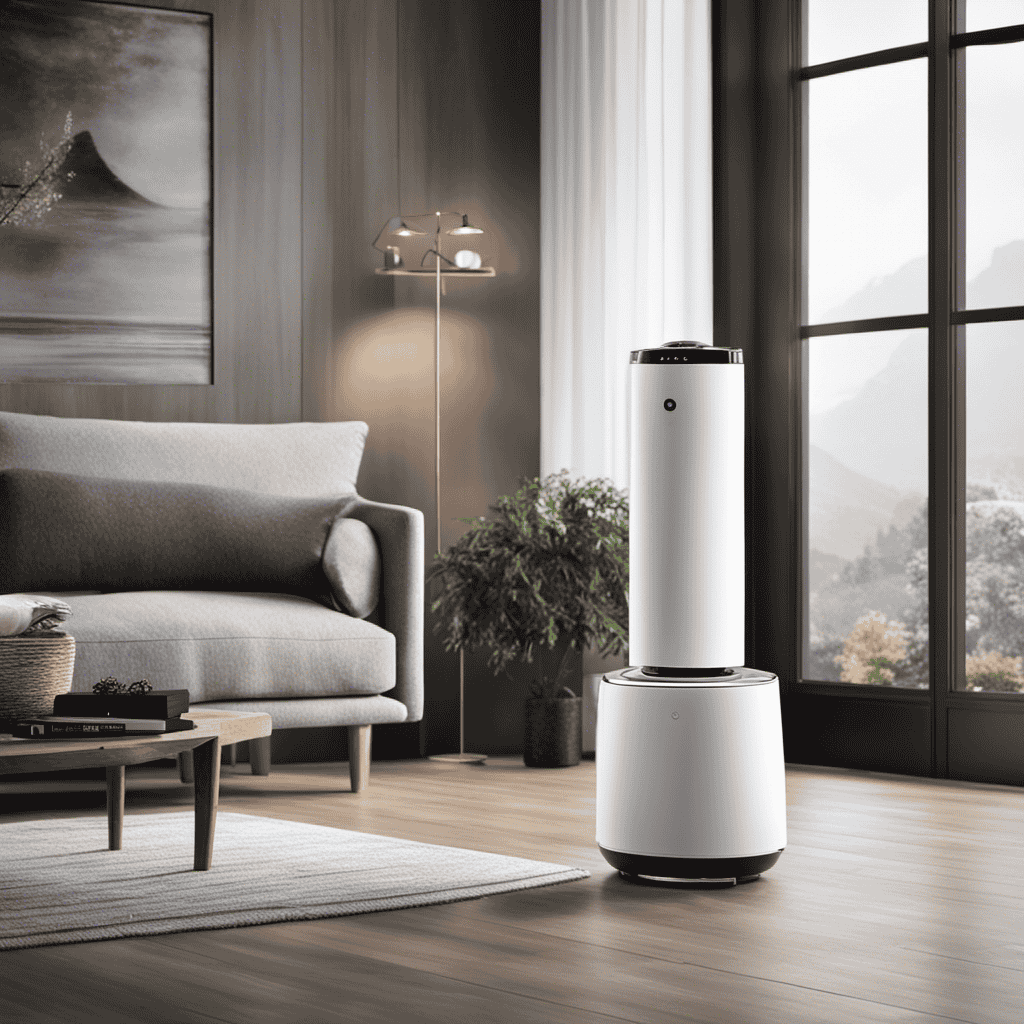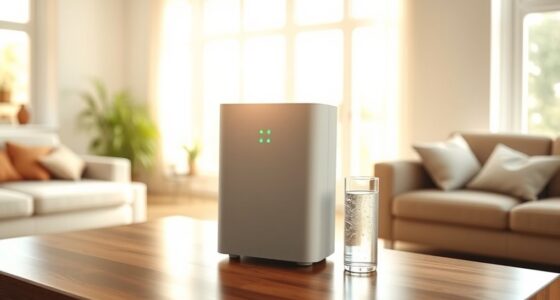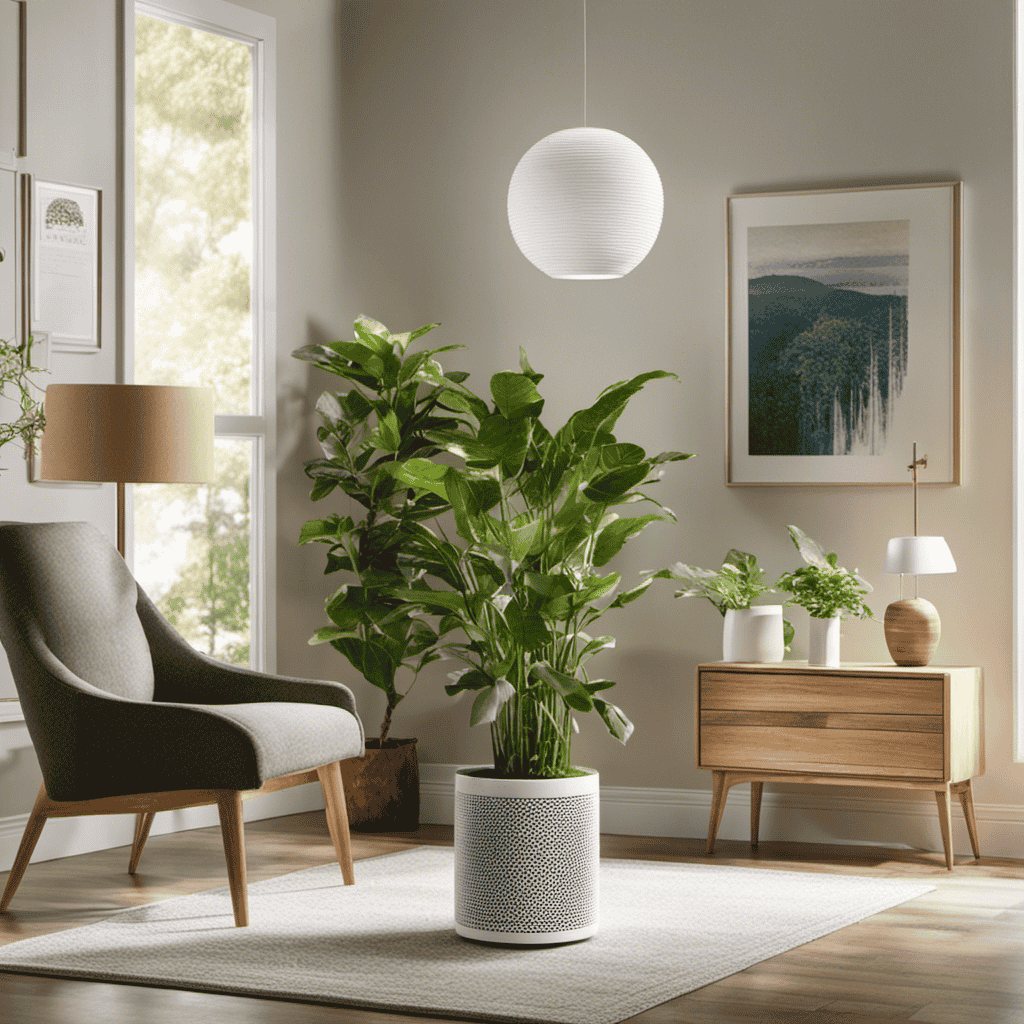Struggling with allergies and asthma, I was always on the lookout for ways to better the air quality in my house. This quest led me to the discovery of the amazing benefits of using an ionizer air purifier.
This device not only cleans the air but also eliminates harmful particles and odors. In this article, we will delve into the mechanics of how an ionizer air purifier works, explore its benefits, and discuss its impact on allergies and asthma.
So, let’s dive in and uncover the secrets of this remarkable technology.
Key Takeaways
- Ionizer air purifiers release negatively charged ions into the air to improve indoor air quality.
- These purifiers remove pollutants, allergens, bacteria, and viruses from the air without requiring regular filter replacements.
- Negative ions promote relaxation, reduce stress levels, and have long-term health benefits such as improved mood and increased energy levels.
- There are different types of ionizer air purifiers, including electrostatic precipitators, ion generators, and plasmacluster ionizers, each with unique features and benefits for improving air quality.
How Does an Ionizer Air Purifier Work
To understand how an ionizer air purifier works, you need to know that it releases negatively charged ions into the air. These ions attach themselves to airborne particles, such as dust, pollen, and pet dander, making them heavier. As a result, these particles are no longer able to float freely in the air, and they settle down onto surfaces or are captured by the air purifier’s filter.
This process, known as ionization, helps to remove harmful pollutants from the air, improving indoor air quality. Ionizer technology works by using a high-voltage electrical field to generate the negatively charged ions. These ions then attract and neutralize positively charged particles, effectively reducing the presence of allergens, pollutants, and odors in the air.
Understanding how an ionizer air purifier works is essential to appreciate the benefits it offers in terms of cleaner and healthier indoor air.
Benefits of Using an Ionizer Air Purifier
There are multiple benefits to using an ionizer air purifier. Compared to traditional filters, ionizer air purifiers offer several advantages. They use ionization technology to release negative ions into the air, which attach to airborne particles and remove them from the atmosphere. This process effectively eliminates pollutants, allergens, and even some bacteria and viruses.
Additionally, ionizers do not require regular filter replacements, making them more cost-effective in the long run. Moreover, ionizer air purifiers can help improve respiratory health by reducing the presence of irritants in the air. The negative ions produced by these purifiers have been shown to promote relaxation and reduce stress levels as well.
Overall, using an ionizer air purifier can greatly enhance the quality of the air you breathe and contribute to a healthier environment.
To further understand the benefits of ionizer air purifiers and their impact on air purification, it is important to delve into the concept of negative ions and their role in the process.
Understanding Negative Ions in Air Purification
Understanding the role of negative ions in air purification can help you comprehend the benefits of using an ionizer air purifier.
Negative ions are oxygen atoms with an extra electron, and they are naturally found in abundance near waterfalls, mountains, and forests.
When negative ions are released into the air, they attach themselves to harmful particles like dust, pollen, and smoke, causing them to become too heavy to stay airborne. This leads to cleaner, fresher air.
The long term health benefits of negative ions include reduced stress, improved mood, and increased energy levels.
Additionally, ionizer air purifiers have been found to be effective against viruses. The negative ions can neutralize viruses by attaching to their protein surface and disrupting their structure, rendering them inactive.
Different Types of Ionizer Air Purifiers
When choosing an ionizer air purifier, you’ll find different types available on the market. Each type has its own unique features and benefits that can help improve the air quality in your home or office. To help you make an informed decision, I’ve created a table below outlining the different types of ionizer air purifiers and their key characteristics:
| Type of Ionizer Air Purifier | Key Characteristics |
|---|---|
| Electrostatic Precipitators | Removes large particles and pollutants from the air using an electric charge. |
| Ion Generators | Emits negative ions into the air to attach to and neutralize airborne particles. |
| Plasmacluster Ionizers | Produces positive and negative ions to eliminate bacteria, mold, and odors. |
Key Features to Look for in an Ionizer Air Purifier
When it comes to choosing an ionizer air purifier, there are several key features that I find important to consider.
Firstly, filter effectiveness is crucial in ensuring that the purifier can effectively remove pollutants and allergens from the air.
Secondly, noise level considerations are important for those who want a quieter environment, especially when using the purifier in a bedroom or office.
Lastly, energy consumption analysis is essential to determine the long-term energy costs associated with running the purifier.
Filter Effectiveness Comparisons
The ionizer air purifier’s filter effectiveness can be compared to other types of air purifiers. When it comes to filter efficiency, the ionizer air purifier stands out as a top contender. Here are some key points to consider:
-
Filter Efficiency:
-
The ionizer air purifier utilizes an electrostatic filter that attracts and captures airborne particles, such as dust, pollen, and pet dander.
-
This filter efficiently removes particles as small as 0.3 microns, improving indoor air quality significantly.
-
Compared to traditional filter-based purifiers, the ionizer air purifier’s filter efficiency is often higher, ensuring cleaner and fresher air.
-
Air Quality Improvement:
-
With its effective filtering system, the ionizer air purifier helps reduce allergens and irritants, providing relief for those with respiratory conditions.
-
By removing harmful particles, it helps eliminate odors, smoke, and other unwanted pollutants, resulting in a healthier and more pleasant living environment.
-
The ionizer air purifier’s filter effectiveness plays a crucial role in improving overall air quality, promoting well-being and comfort in your home or office.
Noise Level Considerations
When selecting an air purifier, there are several factors to consider. One of these factors is the noise level. No one wants a noisy machine disrupting their peace and quiet. That’s why manufacturers have developed various noise reduction techniques to make air purifiers operate quietly. These techniques include the use of sound-absorbing materials, improved fan designs, and advanced motor technology.
Energy Consumption Analysis
One of the factors to consider when selecting an air purifier is its energy consumption. As a consumer, I want to make sure that the air purifier I choose not only effectively cleans the air but also doesn’t consume excessive energy, which can lead to higher electricity bills.
To help with my decision-making process, I conducted an energy consumption analysis and compared the costs of different air purifiers. Here are three important points to consider:
-
Energy Efficiency: Look for air purifiers with energy-efficient features, such as low power consumption and adjustable fan speeds.
-
Energy Star Certification: Consider models that are Energy Star certified, as they meet strict energy efficiency guidelines and can save you money in the long run.
-
Cost Comparison: Compare the energy consumption and estimated annual operating costs of different air purifiers to make an informed decision.
Comparing Ionizer Air Purifiers to Other Types of Air Purifiers
When it comes to air purifiers, there are two main contenders in the market: ionizers and HEPA filters. Both claim to effectively remove pollutants from the air, but they work in different ways.
In this discussion, we will compare the pros and cons of ionizers and HEPA filters, as well as delve into the effectiveness of ionizers in purifying the air.
Ionizers Vs. HEPA Filters
The main difference between ionizers and HEPA filters is their method of capturing and removing airborne contaminants. Ionizers, also known as electrostatic precipitators, use charged plates or wires to attract and remove particulates from the air. On the other hand, HEPA filters rely on a dense mesh of fibers to physically trap particles as air passes through.
Here are some key points to consider when comparing ionizers and HEPA filters:
-
Ionizers:
-
Utilize electrostatic charge to attract and capture particles.
-
Can generate ozone as a byproduct, which may be a concern for those with respiratory issues.
-
Do not remove odors or chemicals from the air.
-
HEPA Filters:
-
Remove 99.97% of particles as small as 0.3 microns.
-
Are highly effective at capturing allergens, dust, pollen, and pet dander.
-
Can help reduce the spread of airborne viruses and bacteria.
Effectiveness of Ionizers
To effectively improve the air quality in your home, you should consider using an ionizer. Ionizers are highly effective in purifying the air by releasing negatively charged ions into the environment. These ions attach themselves to airborne particles like dust, pollen, and pet dander, causing them to become heavy and fall to the ground. This process helps to remove these particles from the air, reducing the presence of allergens and irritants.
In addition to their effectiveness in removing pollutants, ionizers also have various health benefits. They can help alleviate symptoms of allergies and asthma by reducing the number of airborne triggers. Furthermore, ionizers can improve overall respiratory health by neutralizing harmful bacteria and viruses in the air.
Overall, utilizing an ionizer can greatly enhance the air quality in your home and contribute to a healthier living environment.
How Effective Are Ionizer Air Purifiers in Removing Airborne Contaminants
You can determine the effectiveness of ionizer air purifiers in removing airborne contaminants by considering their specific features and customer reviews. Here are three key factors to consider:
-
Ionization technology: Ionizer air purifiers use negative ions to attract and neutralize pollutants, making them highly effective at capturing and removing particles such as dust, pollen, and pet dander.
-
Coverage area: The size of the room that the ionizer can effectively purify is important. Make sure to choose a model that matches the square footage of your space.
-
Filter maintenance: While ionizers don’t require traditional filter replacements, they may still have washable or replaceable pre-filters that help prolong their lifespan and maintain optimal performance.
Understanding the effectiveness of ionizer air purifiers is crucial for improving respiratory health and reducing exposure to allergens and pollutants. With proper research and consideration, you can find an ionizer that meets your specific needs and provides clean, fresh air for you and your family.
Now, let’s explore some common misconceptions about ionizer air purifiers.
Common Misconceptions About Ionizer Air Purifiers
When it comes to ionizer air purifiers, there are several key points that need to be addressed.
One of the main concerns is the potential for harmful ozone production.
It is important to understand the effectiveness of ionizers in removing pollutants as well as the long-term health implications associated with their use.
Harmful Ozone Production
The ionizer air purifier can produce harmful ozone. Many people believe that ozone is beneficial for air purification, but it is important to understand the potential long-term health effects and misconceptions surrounding this gas. Here are some key points to consider:
- Ozone can irritate the respiratory system and worsen existing conditions like asthma.
- Prolonged exposure to ozone can lead to lung inflammation and damage.
- Ozone generators, commonly found in ionizer air purifiers, can produce ozone as a byproduct of their operation.
It is crucial to be aware of these facts and make informed decisions when choosing an air purifier.
Now, let’s explore the effectiveness of ionizer air purifiers against pollutants and how they can improve indoor air quality.
Effectiveness Against Pollutants
To determine the effectiveness against pollutants, it’s important to consider the specific pollutants you are concerned about and research whether ionizer air purifiers can effectively remove them from your indoor air. When it comes to indoor air quality, ionizer air purifiers have been shown to be effective in reducing indoor pollutants such as dust, pet dander, pollen, and mold spores. These devices work by releasing negatively charged ions into the air, which attach themselves to the positively charged particles in the air and cause them to fall to the ground or adhere to surfaces. This helps to remove these pollutants from the air, leading to cleaner and healthier indoor air. Using ionizer air purifiers can have significant benefits for respiratory health, as they can reduce the presence of allergens and irritants in the air, which can be particularly beneficial for individuals with allergies or asthma.
| Pros | Cons |
|---|---|
| Effectively removes pollutants | May produce small amounts of ozone |
| Can improve indoor air quality | Some models may generate noise |
| Helps reduce allergens and irritants | Requires regular maintenance and cleaning |
| Can benefit respiratory health | May not be as effective against larger particles |
Long-Term Health Implications?
If you use an ionizer air purifier regularly, it’s important to consider the potential long-term health implications. While these devices have the potential to provide several benefits, such as reducing allergens and pollutants in the air, there are also potential risks that should not be overlooked.
Here are some things to consider:
-
Ozone production: Ionizer air purifiers can generate ozone as a byproduct, which can be harmful when inhaled in high concentrations. It’s important to choose a model that meets safety standards and has low ozone emission levels.
-
Lung irritation: Some individuals may experience respiratory irritation when exposed to high levels of ions or ozone. If you have a pre-existing respiratory condition, it’s best to consult with a healthcare professional before using an ionizer air purifier.
-
Maintenance: Regular cleaning and maintenance of the unit are essential to ensure its effectiveness and prevent the buildup of pollutants on the ionizing plates.
The Role of Ionizers in Improving Indoor Air Quality
Ionizers help reduce airborne particles, such as dust and pollen, improving indoor air quality. These devices work by emitting negative ions into the air, which attach to positively charged particles, causing them to become too heavy to remain airborne and ultimately fall to the ground. This process effectively reduces the levels of pollutants in the air, including allergens and irritants that can trigger respiratory issues. Studies have shown that ionizers can be particularly beneficial for individuals with asthma and allergies, as they help to alleviate symptoms and improve overall respiratory health. Additionally, ionizers can also help to neutralize odors and remove harmful substances, such as smoke and volatile organic compounds (VOCs).
| Pros | Cons |
|---|---|
| Improves indoor air quality | Can produce ozone |
| Reduces allergens and irritants | Requires regular cleaning |
| Helps alleviate respiratory issues | May not remove all pollutants |
| Neutralizes odors | May have limited effectiveness |
| Removes harmful substances |
Overall, ionizers can play a significant role in improving indoor air quality and promoting better respiratory health. However, it is important to consider the potential drawbacks and ensure proper maintenance to maximize their effectiveness.
Are Ionizer Air Purifiers Safe for Everyone
Now that we understand the role of ionizers in improving indoor air quality, let’s delve into the question of whether ionizer air purifiers are safe for everyone.
As an expert in this field, I have analyzed the research and can provide some insights.
-
Long-term Health Risks: While ionizers can effectively remove airborne particles, they also produce ozone as a byproduct. High levels of ozone can have detrimental effects on our health, including respiratory issues and lung damage. It is crucial to consider the long-term exposure to ozone when using ionizer air purifiers.
-
Impact on Respiratory Conditions: Individuals with respiratory conditions, such as asthma or chronic obstructive pulmonary disease (COPD), should exercise caution when using ionizer air purifiers. The release of ozone can exacerbate their symptoms and potentially worsen their respiratory conditions.
-
Precautions to Take: If you decide to use an ionizer air purifier, ensure that it is ozone-free or has a low ozone emission level. Additionally, it is advisable to consult with a healthcare professional, especially if you have pre-existing respiratory conditions.
Factors to Consider When Choosing an Ionizer Air Purifier
When choosing an ionizer air purifier, it’s important to consider factors such as the size of the room and the specific filtration needs.
One crucial factor to consider is the noise level of the purifier. Some ionizers can be quite noisy, which can be disruptive, especially in bedrooms or offices where a quiet environment is desired. It’s important to find a purifier that operates at a noise level that is comfortable for you.
Another important factor to consider is the filter effectiveness. Ionizer air purifiers use filters to remove pollutants from the air, so it’s essential to choose a purifier with a high-quality filter that can effectively capture particles like dust, pollen, and pet dander. Checking the filter’s efficiency rating and its ability to remove specific contaminants is crucial in ensuring clean and healthy air in your space.
Maintaining and Cleaning an Ionizer Air Purifier
To keep your ionizer running efficiently, it’s important to regularly clean and maintain it. Here are some maintaining tips for optimal performance:
-
Clean the ionizer plates: Gently remove the plates and wipe them with a damp cloth to remove any accumulated dust or debris. Be sure to dry them thoroughly before reinstalling.
-
Check the filters: Depending on the model, your ionizer may have a pre-filter or a HEPA filter. Regularly inspect these filters for dirt and replace them as needed to ensure proper airflow.
-
Clean the exterior: Use a soft cloth to wipe down the exterior of the ionizer to remove any dust or fingerprints. Avoid using harsh chemicals or abrasive materials that could damage the unit.
Can Ionizer Air Purifiers Help With Allergies and Asthma
If you suffer from allergies or asthma, using an ionizer can help alleviate symptoms by reducing airborne allergens and irritants. Ionizer air purifiers work by releasing negatively charged ions into the air, which attach to positively charged particles like dust, pollen, and pet dander. This causes these particles to become heavy and fall to the ground or stick to surfaces, effectively removing them from the air you breathe.
While ionizers can be effective in reducing allergens, there are some safety concerns associated with their use. High levels of ozone, a byproduct of ionization, can be harmful to your health, especially for individuals with respiratory conditions. It is important to choose an ionizer that produces low levels of ozone and to use it in a well-ventilated area.
In the next section, we will explore the impact of ionizer air purifiers on odor control.
The Impact of Ionizer Air Purifiers on Odor Control
You’ll be pleased to know that ionizers can effectively remove unpleasant odors from the air in your home. Here are three ways ionizer air purifiers can help with odor control and provide health benefits:
-
Neutralization: Ionizers release negative ions into the air, which attach themselves to positively charged odor particles, neutralizing them and eliminating the smell.
-
Elimination of pollutants: Ionizers can remove airborne pollutants that contribute to unpleasant odors, such as smoke, pet dander, and cooking smells.
-
Improved air quality: By removing odors and pollutants, ionizer air purifiers can help improve indoor air quality, leading to a healthier living environment and reducing the risk of respiratory issues.
With the ability to tackle odors and enhance air quality, ionizer air purifiers offer a comprehensive solution for odor control and improving overall health.
Now, let’s explore the cost and energy efficiency of these devices.
Exploring the Cost and Energy Efficiency of Ionizer Air Purifiers
When considering the cost and energy efficiency of ionizer air purifiers, it’s important to compare them to traditional filter-based purifiers.
In terms of upfront cost, ionizers tend to be more expensive, but they can offer potential energy savings in the long run due to their lower power consumption.
However, it’s crucial to also consider the long-term cost implications, such as the need for regular maintenance and replacement of ionizing plates, which can add to the overall expenses.
Cost Comparison: Ionizers Vs. Filters
The cost of ionizer air purifiers is typically lower than that of filters, making them an attractive option for those looking to improve their indoor air quality without breaking the bank.
Here are some key points to consider when comparing the cost and performance of ionizers and filters:
-
Filter Maintenance:
-
Filters require regular replacement, which can add up over time.
-
Ionizers, on the other hand, have reusable plates that need to be cleaned periodically, resulting in lower long-term maintenance costs.
-
Performance Comparison:
-
Filters capture particles and allergens, providing a high level of filtration.
-
Ionizers emit negative ions to charge particles, causing them to settle and be removed from the air. However, they may not capture all particles as effectively as filters.
Considering these points, it’s important to weigh the upfront cost and ongoing maintenance expenses against the desired level of air purification when choosing between ionizers and filters.
Energy Savings Potential
One potential benefit of using ionizers or filters is the energy savings they can provide. By improving indoor air quality and reducing the need for excessive heating or cooling, ionizers and filters can help decrease energy consumption and lower utility bills. Ionizers work by releasing negative ions into the air, which attach to pollutants and cause them to fall out of the air. Filters, on the other hand, trap particles and pollutants as air passes through them. Both methods effectively remove harmful substances from the air, allowing for cleaner and healthier indoor environments. Not only do ionizers and filters improve air quality, but they also contribute to energy savings and have a positive environmental impact.
| Ionizers | Filters |
|---|---|
| Releases negative ions into the air | Traps particles as air passes through |
| Removes pollutants from the air | Removes pollutants from the air |
| Improves indoor air quality | Improves indoor air quality |
| Decreases energy consumption | Decreases energy consumption |
| Lower utility bills | Lower utility bills |
| Positive environmental impact | Positive environmental impact |
Long-Term Cost Implications
Using ionizers or filters can result in long-term cost savings by improving indoor air quality and reducing energy consumption. When considering the long-term cost implications of using these air purifiers, there are a few key factors to consider:
-
Long term maintenance: While ionizers may have a lower upfront cost compared to filters, they often require more frequent maintenance. This includes cleaning the plates or replacing the ionizing wires regularly to ensure optimal performance. Filters, on the other hand, may require less frequent maintenance but will need to be replaced periodically.
-
Cost effectiveness analysis: To determine the overall cost effectiveness, it is important to consider not just the initial purchase cost, but also the ongoing maintenance and replacement costs. Conducting a cost effectiveness analysis can help identify which option provides the best value for money over the long term.
-
Energy consumption: Both ionizers and filters can reduce energy consumption by improving indoor air quality. Cleaner air means that the HVAC system doesn’t have to work as hard to circulate and filter the air, resulting in lower energy bills over time.
Considering these factors in a cost effectiveness analysis can help make an informed decision about which air purifier option is best suited for your specific needs and budget.
Frequently Asked Questions
Can Ionizer Air Purifiers Help With Allergies and Asthma?
Yes, ionizer air purifiers can help with allergies and asthma. They work by releasing negatively charged ions that attach to airborne particles, making them heavy and causing them to fall out of the air. Unlike traditional air purifiers, ionizers do not use filters. However, it is important to note that some ionizer air purifiers can emit harmful ozone, so it is essential to choose a model that is ozone-free.
What Is the Impact of Ionizer Air Purifiers on Odor Control?
When it comes to odor control, ionizer air purifiers are effective. By releasing negatively charged ions, they neutralize airborne contaminants that cause unpleasant smells, improving indoor air quality. It’s a game-changer for fresh, clean air.
How Do Ionizer Air Purifiers Compare in Terms of Cost and Energy Efficiency?
When comparing ionizer air purifiers, it is important to consider the cost and energy efficiency. By analyzing the cost comparison and energy efficiency, one can make an informed decision on which purifier is best for their needs.
Are Ionizer Air Purifiers Safe for Everyone?
Ionizer air purifiers may not be safe for everyone due to potential health risks. However, they are effective in removing airborne pollutants. It’s important to consider individual sensitivities and consult with a professional.
What Are Some Common Misconceptions About Ionizer Air Purifiers?
Misconceptions about ionizer air purifiers include their ineffectiveness in removing larger particles, the belief that they produce harmful ozone levels, and the notion that they can replace regular air filters.
Are Ionizer Air Purifiers Effective at Removing Pollutants from the Air?
Ionizer air purifiers use charged particles to remove pollutants from the air. They work by emitting negative ions that attach to pollutants and neutralize them. However, some studies suggest that ionizer air purifiers may produce ozone, which can be harmful. It’s important to carefully consider their effectiveness and potential drawbacks.
Conclusion
After diving deep into the world of ionizer air purifiers, I am convinced that these little devices are like magical fairies that flutter around and cleanse the air we breathe.
They work by releasing negative ions, which attach to harmful particles and make them fall to the ground like leaves in autumn. With their powerful purification abilities, ionizer air purifiers can help alleviate allergies and asthma, while also tackling pesky odors.
And don’t worry about breaking the bank or draining your energy, because these fairies are cost-effective and energy-efficient.
So let these enchanting devices transform your air into a breath of fresh air!
